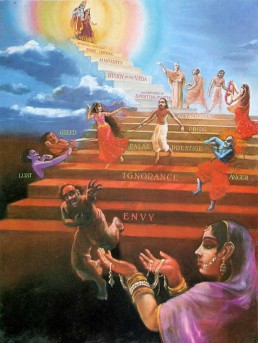Desire for the sense-objects of the world and the urge for sense-gratification are the great factors which cloud the discriminative potentialities in the human intellect. It is impossible that an individual is not made conscious of his own Self, in the light of a powerful and strong discrimination.
Earlier, we were told that the deity for whose propitiation we performed the Yajna was none other than “the productive potential in any given field of activity.” Reading the stanza in the light of this interpretation we may say that the deity mentioned here denotes nothing other than the various joys contained in the different sensuous fields which are courted by us, when we get lashed by desires, in order that we may gain a complete and exhaustive satisfaction from them.
Desires are the springs from which thoughts continuously gurgle up to flood the mental zone, and disturb the glorious reflection of Truth in it. When the mind is thus disturbed, the discriminative capacity in the intellect is rendered dull, and naturally, that individual becomes incapable of distinguishing in his understanding, the Real from the unreal. When the brilliance of the human intellect has been clouded with the vapours of desire, the owls of negativity and delusory attachments start hooting in the jungles of that mind.
It is not the mere appearance of desires in the mind that causes the fall of man. No individual can resist the compelling charm of the desires rising in his bosom. But when he comes to identify himself with them, the thoughts rising in him are directly governed by his desires. When once a given desire has been identified with, the desirer himself, unconsciously, comes to lend an uncontrollable amount of dynamism to the upsurge of the flood of thoughts.
Thoughts themselves are inert matter, inasmuch as they are the by-product of food, being constituted of the subtlest aspect of the food consumed. These inert thought-waves gather a momentum and force by borrowing their strength and vigour from the Self, through the individual’s enthusiastic identification with those desires. The urge of thoughts determines the action. The actor in the field, for the time-being, is rendered incapable of discriminating whether the action undertaken can, or cannot, ultimately bring to him a permanent and an enduring satisfaction. Drunk with the idea that he will be at least temporarily appeased, the individual struggles hard and strives intensively to invoke and propitiate THE PRODUCTIVE POTENTIAL OF ANY GIVEN FIELD OF HIS ACTIVITY (DEVATA).
In thus invoking the Devata of a given field, the individual has to strive in a proper and fitting fashion. The methods of assembling the required instruments, the techniques of their application, the time intervals necessary for maturing the results, and the type of gains accrued from the different kinds of application… all these differ from field to field in the world. Therefore, each one will have to “FOLLOW THIS OR THAT RITE,” according to the type of his desires.
The reason why different persons thus struggle hard so differently, leaving aside all sincere struggles to realise the Self, as “VASUDEVA IS ALL THIS,” is explained here in the second line. Each individual helplessly functions in the different fields of his temporary fascinations, according to the mental impressions, gathered in his earlier moments of activity and thought. To conceive that “the Creator is putting ideas into each one of us because of which one is good and another vile,” is a philosophy of the defeatist, of the impotent, of the sluggard. True men of action, with the daring of a well-developed intellect, can very easily see through men and their behaviours and come to this bold conclusion that each man acts as per the schedule, maintained and ordered by himself, during his own past actions.
In short, a deluded person strives hard, running after the mirage of sensuality, vainly hoping to gain therein a satisfaction that is at once infinite and immortal, while another is found to have the subtle discrimination to discover for himself the hollowness and futility of sense-pursuit. This latter type withdraws from all these ultimately unprofitable fields, and with avidity seeks the path to the Real.
WHAT THEN IS THE FUNCTION OF THE ATMAN, THE GUARDIAN ANGLE IN EACH ONE OF US?

